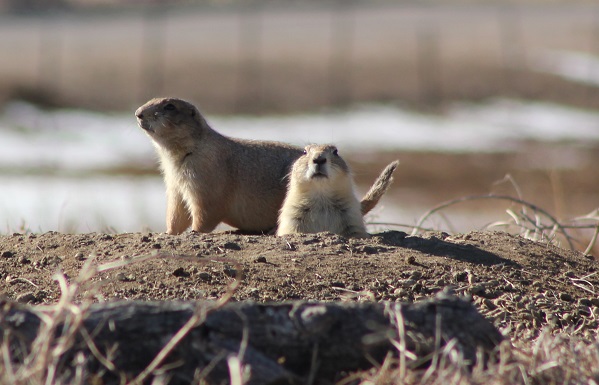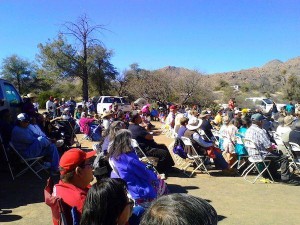Hundreds Gather at Oak Flat to Fight for Sacred Apache Land
13 Feb
Resistance to American Fascism grows. We in Deep Green Resistance share the outrage of the San Carlos Apache tribe over the attempted incursion on their land, conspired to by clever duo of the American government and mining interests. We hope you will join those who have committed to protecting the land, and all the life it hosts.
By Lee Allen, Indian Country Media Network
As the morning sun rose high enough to burn off the chilly overnight temperatures, mesquite fires scattered throughout the Oak Flats Campground offered a warm welcome to a special day for Arizona’s San Carlos Apache tribe.
Michael Paul Hill/Facebook Protesters gathered for a day of spiritual succor at Oak Flat, the sacred Apache site that was all but handed over to Resolution Copper in the latest must-pass federal defense-spending bill.
Michael Paul Hill/Facebook
Protesters gathered for a day of spiritual succor at Oak Flat, the sacred Apache site that was all but handed over to Resolution Copper in the latest must-pass federal defense-spending bill.
Some 300 tribal members and supporters from across the country had gathered to protest the infringement of traditional Apache holy lands. There were Chippewa, Navajo, Lumbi, Pauite, Havasupai, and representatives of the National American Indian Movement and the National American Indian Veterans group, as well as non-indigenous supporters representing myriad concerns including those of environmentalists and other lovers of nature. All were furious at Congress’s sneaky transfer of sacred Apache land to a mining company and vowing to do what they could to see that it didn’t happen.
“What was once a struggle to protect our most sacred site is now a battle,” said San Carlos Apache Tribal Chairman Terry Rambler, organizer of the grassroots movement aimed at stopping transfer of hundreds of acres of ceremonial land to those who would dig a mile-wide hole in the ground in a search for copper.
RELATED: San Carlos Apache Would Get Biggest Shaft Ever in Copper Mine Land Swap
San Carlos Apache Leader Seeks Senate Defeat of Copper Mine on Sacred Land
Arizona’s Apache Tribe represents a culturally rich society with heritage tied to Mother Earth. As a people, they extend a Hon Dah welcome greeting to all who wish to share their culture and history. But now they are fighting to keep their holy lands culturally sacrosanct.
“Our homelands continue to be taken away,” said former San Carlos Chairman Wendsler Nosie Sr., decrying what he termed the dirty way in which a land-swap rider had been attached to a must-pass bill that sailed through Congress and was signed into law by President Barack Obama. The amended legislation, with the support of Arizona Senator John McCain, was “an action that constitutes a holy war, where tribes must stand in unity and fight to the very end,” according to Nosie.
The legislation that the former chairman termed “the greatest sin of the world” is the Southeast Arizona Land Exchange and Conservation Act, which gives a 2,400-acre tribally sacred site to a global mining entity, Resolution Copper, that wants to destroy its natural state with a massive mine intended to extract an ore body located 7,000 feet below ground level. That ground is hallowed to the Apache peoples whose reservation border is just east of the proposed mine at Oak Flat, home to Indigenous Peoples since prehistoric times, a place where acorns and medicinal herbs are gathered and coming-of-age ceremonies are held.
Kicked off by earlier protests in both Tucson and outside Senator McCain’s Phoenix office, the multi-pronged awareness approach to mitigate the potential fate of Oak Flat picked up momentum via a two-day, 44-mile, march from the San Carlos tribal headquarters and culminated in a weekend-long Gathering of Nations Holy Ground Ceremony, “A Spiritual Journey to a Sacred Unity,” at Oak Flat.
Following a holy ground blessing, the morning was filled with traditional, cultural and religious dances, with Rambler dancing and Wendsler joining the group of drummers. The weekend of solidarity was epitomized by guest speaker and activist preacher John Mendez.
“What the system doesn’t know, what Resolution Copper doesn’t know, is there is nothing that can break our spirit and keep us from moving forward to victory,” Mendez told the assembled. “This is a protracted struggle, but if we stay true to task, we will win. A single flame can start a large fire, and we’ve created a fire that cannot be extinguished.”
The Apache struggle has become part of the ongoing battle worldwide for Indigenous Peoples protecting sites that are sacred to them because of the places’ importance to both spiritual and physical survival.
“This issue is among the many challenges the Apache people face in trying to protect their way of life,” Chairman Rambler toldIndian Country Today. “At the heart of it is freedom of religion, the ability to pray within an environment created for the Apache. Not a manmade church, but like our ancestors have believed since time immemorial, praying in an environment that our creator god gave us. At the heart of this is where Apaches go to pray—and the best way for that to continue to happen is to keep this place from becoming private land.”
RELATED: San Carlos Apache Leader: ‘What Was a Struggle to Protect Our Most Sacred Site Is Now a Battle’
Yavapai-Apache Chairman: ‘Oak Flat Holy Sites are Central to Apache Spiritual Beliefs’
Spiritual Unity Can Save Sacred Apache Land From Mining
Despite Obama’s signature on the measure, the administration has expressed displeasure as to how the legislation flew under the radar to become law.
“I am profoundly disappointed with the provision of the bill that has no regard for lands considered sacred by nearby Indian tribes,” said U.S. Secretary of the Interior Sally Jewell.
The passage has created numerous schisms.
“The nearly decade-long fight over access to the federally protected land has ignited a feud that has split families and ended lifelong friendships,” the Los Angeles Times noted.
It also has united those who oppose Rambler, and the ongoing, nearly 10-year-old struggle has garnered support from more than 500 tribes, many who face similar situations with mining or development proposed in areas that other Native Americans consider holy. If this can happen to the Apache nation, it can happen to any other nation was the general feeling.
“We have a similar situation with an effort to build a tramway down to the bottom of the Grand Canyon,” said Lorenzo Robbins, a Navajo from Northern Arizona.
“We’re fighting a strong battle to protect Mother Earth from uranium mining,” said Uqalla, a member of the Havasupai tribe. “The responsibility of all indigenous spiritual carriers is to protect the earth.”
Rambler, welcoming the support, said it is indeed everyone’s battle.
“We must stand together and fight,” Rambler said. “We’re drawing a line in the sand on this one. We’re against this specific project because it’s going to desecrate and destroy this whole area and the Apache way of life we are accustomed to.
“This gathering and our direction in the future is to keep an awareness of the situation in the public mind, in the mind of Congress, and to let everyone know this issue is not going to go away,” Rambler said. “We need to stay on top of it every day to make sure our voices are heard. We’re praying to our creator god, asking him to guide us throughout this whole process so that we can win in the end and preserve what he created for us.”
Video: What Resolution Copper Wants to Inflict on Apache Sacred Land


No comments yet